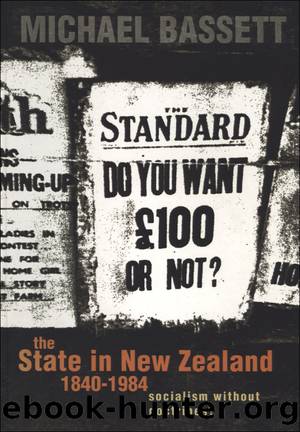The State in New Zealand, 1840-198 by Michael Bassett

Author:Michael Bassett [Bassett, Michael]
Language: eng
Format: epub
Tags: History, Australia & New Zealand
ISBN: 9781775582069
Google: RVflAQAAQBAJ
Publisher: Auckland University Press
Published: 2013-11-01T03:38:11+00:00
Expanding health services; a district nurse checks a Maori babyâs progress on the Waihara gumfields, late 1940s. ATL F-46725-1/2
However, in the postwar world Fraserâs Government left little to chance. Public Works projects, especially hydro-electrical construction, were given high priority as the Ministry of Works struggled to satisfy escalating demand for electricity. By March 1949 there were 5000 more workers employed on state projects than there had been in 1944. Treasury warned the Minister of Finance about overheating the economy.100 The Government pushed ahead, although it realised that continuing controls would be necessary if it was to survive at the ballot box.
The twin goals of maintaining full employment and spending more on welfare at a time when so many service personnel were coming back into the community with pent-up ambitions to spend their record savings-bank deposits,101 threatened a huge increase in demand for imports. Shortages of raw materials and finished products compounded the problem. Faced with runaway inflation or tight controls, Labour passed a Control of Prices Act in November 1947. It put the Price Tribunal into statute for the first time, and outlined its regulatory powers.102 More subsidies were introduced to restrain retail prices. Sugar, wheat, bread, butter, cheese, milk, eggs, oatmeal, phosphates, cornsacks, many fertilisers, fertiliser bags, cow covers, and the transport by road and sea of timber and fertilisers were now subsidised. Various payments were made for the eradication of noxious weeds and rabbits and for the testing of cows. When Ashwin reported to his minister in February 1947 that subsidies were running at £800,000 above budget, and were certain to cost an extra £4 million for the year 1947-48, Nash asked Leicester Webb, the Director of Stabilisation, to conduct a study of the likely costs of removing subsidies altogether.103 The reply made dismal reading; they were now economic woof and warp. The Government tentatively removed some farming subsidies as well as those on tea and sugar. Rail and shipping charges were allowed to rise. The following year, with an election on the horizon Nash increased subsidies once more. Their cost reached £14.6 million for the financial year 1949-50.104
Government subsidies and special grants became such an integral part of postwar stabilisation that most people came to believe they had a right to them. In 1947 Fraser received a request from the Canterbury Cricket Association for subsidies on their purchases of bats, balls and clothing,105 while a group of Motueka tobacco growers testily informed the Tobacco Board in November that they took âstrong exception on principleâ to the notion that they might contribute to the cost of flood protection work in their area. Local authorities âhave an obligationâ to do the work, âand the Government has a greater obligation to supply the financeâ.106 The incoming Minister of Finance, S. G. Holland, observed in his budget in August 1950 that âmany people have a fallacious idea that what the State provides does not cost them anythingâ.107
Fraser retained office against all odds at the general election on 27 November 1946. Some ministers were astonished by the Governmentâs victory, albeit by the narrow margin of four seats.
Download
This site does not store any files on its server. We only index and link to content provided by other sites. Please contact the content providers to delete copyright contents if any and email us, we'll remove relevant links or contents immediately.
The Memory Code by Lynne Kelly(2396)
Schindler's Ark by Thomas Keneally(1879)
Kings Cross by Louis Nowra(1794)
Burke and Wills: The triumph and tragedy of Australia's most famous explorers by Peter Fitzsimons(1411)
The Falklands War by Martin Middlebrook(1380)
1914 by Paul Ham(1340)
Code Breakers by Craig Collie(1248)
A Farewell to Ice: A Report from the Arctic by Peter Wadhams(1244)
Paradise in Chains by Diana Preston(1244)
Burke and Wills by Peter FitzSimons(1234)
Watkin Tench's 1788 by Flannery Tim; Tench Watkin;(1228)
The Secret Cold War by John Blaxland(1208)
The Protest Years by John Blaxland(1201)
THE LUMINARIES by Eleanor Catton(1184)
30 Days in Sydney by Peter Carey(1156)
Lucky 666 by Bob Drury & Tom Clavin(1149)
The Lucky Country by Donald Horne(1137)
The Land Before Avocado by Richard Glover(1115)
Not Just Black and White by Lesley Williams(1082)
